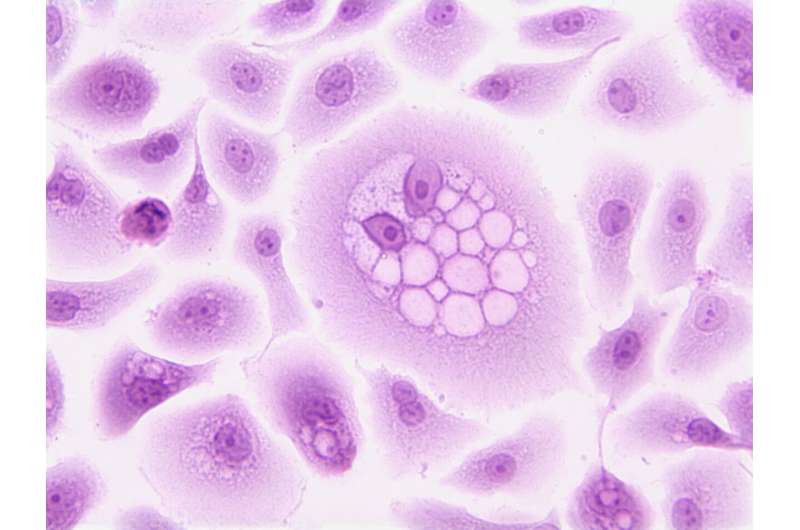This article has been reviewed according to Science X's editorial process and policies. Editors have highlighted the following attributes while ensuring the content's credibility:
fact-checked
proofread
Researchers report results in rare gynecologic cancers from DART immunotherapy trial

Results from the S1609 DART clinical trial, which tested an immunotherapy combination of ipilimumab plus nivolumab in 53 cohorts of patients with rare cancers, are being reported for five cohorts of patients who had rare gynecologic cancers.
In three of those five cohorts—the cohorts for clear cell ovarian cancer; small cell ovarian carcinoma, hypercalcemic type; and non-epithelial ovarian cancer—some patients have shown durable responses to the immunotherapy, including several patients whose complete remissions have now lasted more than three years.
The findings will be presented in three abstracts at the 2023 annual meeting of the American Association for Cancer Research (AACR) in Orlando, Florida, on April 17. The trial was conducted by the SWOG Cancer Research Network.
The rare cancers being reported on are clear cell ovarian cancer (cohort 46, N = 19), clear cell endometrial cancer (cohort 45, N = 8), clear cell cervical cancer (cohort 42, N = 5), non-epithelial ovarian cancer (cohort 13, N = 17), and small cell ovarian carcinoma, hypercalcemic type (cohort 49, N = 5).
The work was led and is being presented by Young Kwang Chae, MD, MPH, MBA, a SWOG investigator at the Northwestern University Feinberg School of Medicine and Robert H. Lurie Comprehensive Cancer Center.
"These are very exciting results we're seeing," Chae said. "Historically, rare cancers have not received much attention due to their rarity. However, it's precisely these patients with rare gynecologic cancers that are often with the greatest unmet need for therapy options.
"In many of these cancer types, we are reporting for the first time a meaningful impact to patient outcomes. These results are helping us identify key subtypes to focus future efforts on, and we would also need a more detailed investigation into the biology of these cancers with a focus on the translational aspects."
Among the 19 patients with clear cell ovarian cancer enrolled in the trial, three had disease that showed a complete response to treatment, with two of these patients still in complete remission after more than three years.
In the trial group of five patients with small cell ovarian carcinoma, hypercalcemic type, one patient experienced a complete response to treatment, with their complete remission now lasting about three years as well. Also in this cohort, a second patient's disease showed a partial response to treatment.
In the cohort of patients with non-epithelial ovarian cancer, four of the eight patients with a subtype known as granulosa cell tumors experienced stable disease or better for at least six months on treatment, a clinical benefit rate in this subtype of 50%. One additional patient in this cohort, with Sertoli-Leydig cell subtype disease, also showed clinical benefit from treatment.
These results are just the latest from the DART (Dual Anti-CTLA-4 & Anti-PD-1 blockade in Rare Tumors) trial, a "basket" trial that tested the combination of ipilimumab and nivolumab against a wide range of rare cancers. These study drugs, known as immune checkpoint inhibitors, were provided Bristol Myers Squibb, the maker of both drugs.
Through DART (also known as S1609), this drug combination was tested in more than 800 patients with 53 different types of rare tumors. Other rare cancers that have been treated with some success in the trial include metaplastic breast cancer, neuroendocrine tumors, and angiosarcoma.
Rare cancers make up about a quarter of all cancers diagnosed. But because there are hundreds of types and each is so scarce, they are difficult to study. The DART trial has expanded opportunities for immunotherapy drug development in these cancers.
More information: CT161/23: "A phase II basket trial of dual anti-CTLA-4 and anti-PD-1 blockade in rare tumors (DART) SWOG S1609: the non-epithelial ovarian tumor cohort #13"
CT162/24: "A phase II basket trial of dual anti-CTLA-4 and anti-PD-1 blockade in rare tumors (DART) SWOG S1609: the clear cell ovarian, endometrial, cervical cancer cohorts #42, 45, 46"
CT163/25: "A phase II basket trial of dual anti-CTLA-4 and anti-PD-1 blockade in rare tumors (DART) SWOG S1609: the small cell carcinoma of the ovary, hypercalcemic type cohort #49"


















